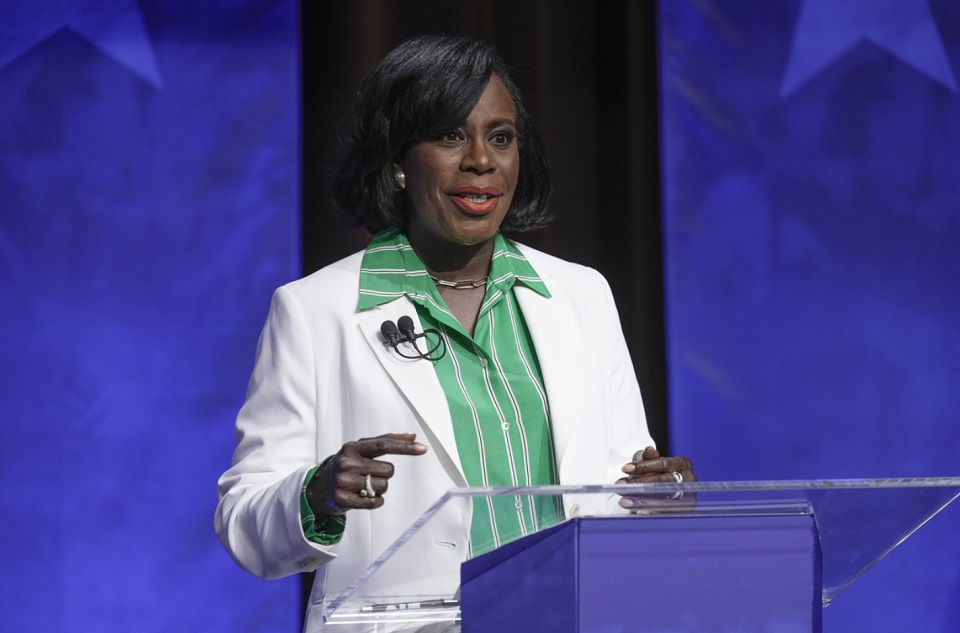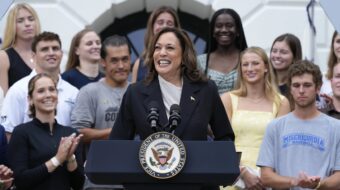
PHILADELPHIA—Progressive forces went one-for-two in Democratic primary races for top municipal jobs in Pennsylvania: Helen Gym lost the top tilt, for the Philadelphia mayoralty, to more moderate and more establishment Cherelle Parker. But progressive State Rep. Sara Innamorato won the race to be the next Allegheny County (Pittsburgh) Executive.
The May 16 Democratic primaries in the Keystone State’s two largest cities are tantamount to election, given the lopsided Democratic edge in both, including seven-to-one in Philadelphia. Parker won 33% of the vote, to 22.5% for Rebecca Rhynhart and 21.5% for Gym.
The Working Families Party, which has racked up municipal election wins in Pennsylvania, including electing Philadelphia City Councilmember Kendra Brooks, endorsed and campaigned for Gym, as well as council candidates. Gym would have been the city’s first Asian-American mayor and first woman mayor.
Parker will be the first Black woman mayor of the nation’s sixth-most-populous city. When she wins in November, a formality, she’ll join newly elected African Americans leading the nation’s second-largest city, Los Angeles, and the third-largest, Chicago, where Karen Bass and Brandon Johnson recently took office as mayor.
Progressives united behind Gym. They were led by the Philadelphia Federation of Teachers, given former teacher Gym’s record of fighting to take back control of the city schools from the Republican-run state legislature and her pledge to promote union jobs, and her plan to improve the schools, including wraparound services.
National progressives backed Gym
Notable national progressives, led by Sen. Bernie Sanders, Ind-Vt., campaigned for Gym, too. But that outside help prompted a tweeted subtle dig from Parker, a former city council president and state legislator.
“This election will be won on the ground and decided by real Philadelphians who deeply understand how important this moment is for the future of our city,” it read. But Parker told local TV stations after she voted that “we want to unify our city, based on issues, so Parker’s going to be a unifying mayor.” During the campaign she put forward an anti-crime platform that called for hiring many more police, a position many progressives said did not address the root causes of crime including poverty and lack of resources in affected communities.
Gym was also a target of a negative ad campaign by the most conservative of the nine hopefuls, rich developer Allan Domb, who finished a distant fourth. He pumped $6 million of his own money into the contest, attacking Gym, but won for himself only 11.5% of the vote.
Our Revolution, the organization formed by Sanders’ 2016 presidential campaign backers, also backed Gym. In Philadelphia, “You’ve got an old guard Democratic machine, just like you do in Chicago, although that formation has been rattled within the last couple of years” by successful progressive and Democratic Socialist candidates, Executive Director Joseph Geevarghese told the Associated Press before the Philly balloting.
That pattern repeated in Chicago this month: The progressive bloc on the 50-member council, including DSA members, hit a new all-time record, and there are nine LGBT councilmembers now in Chicago.
Parts of the old Philadelphia machine, including the Democratic City Committee, sat out the primary, leaving individual ward leaders all over the map. Unions split, too. The Teachers backed Gym, Service Employees 32BJ hit the streets for Parker, and AFSCME backed Jeff Brown, who finished fifth. The police, who are not a union, backed Domb. He ran on a dog-whistle and racist platform.
In the fall general election, WFP will try to oust the Philadelphia City Council’s last remaining Republican from an at-large seat reserved for non-majority party candidates. Four years ago, WFP’s Kendra Brooks won the other at-large seat in that class, bouncing a Republican.
And union organizer and progressive Seth Anderson-Oberman in the 8th Ward, backed by WFP and other progressive organizations, was in a too-close-to-call race against a three-term incumbent, with absentee ballots yet to be counted.
On the other side of the state, Innamorato easily won the Democratic nomination to be Allegheny County Executive, with 35% of the vote to runner-up John Weinstein’s 22.5%. Innamorato’s key issue stands included criminal justice reform and battling climate change by ending fracking.
“Allegheny County deserves better than the status quo, where corporations are the only winners and working people get the short end of the stick. It’s clear that Sara is the only candidate with the bold progressive vision that working families in Allegheny County deserve,” said WFP Mid-Atlantic Elections Director Shoshanna Israel.
We hope you appreciated this article. At People’s World, we believe news and information should be free and accessible to all, but we need your help. Our journalism is free of corporate influence and paywalls because we are totally reader-supported. Only you, our readers and supporters, make this possible. If you enjoy reading People’s World and the stories we bring you, please support our work by donating or becoming a monthly sustainer today. Thank you!












Comments